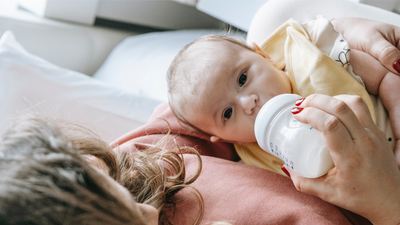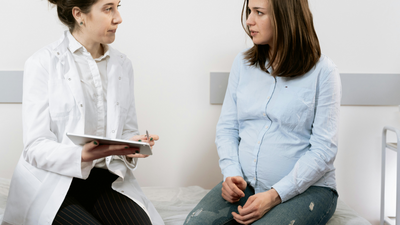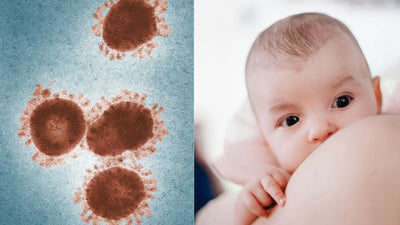Your Guide to Mastitis & Nutrition - Using Food for Prevention and Treatment
Your Guide to Mastitis & Nutrition - Using Food for Prevention and Treatment
By Nina-Marie Rueda, ND
What is mastitis and how can nutrition help?
Mastitis is a condition of milk stasis in the breast tissue. When milk stops moving it can start clogging and stagnant milk creates conditions for bacteria to grow. Even worse, mastitis can turn into an infection if left untreated.
Symptoms include swelling, redness, sensitivity to touch, warmth at the site of infection, small cuts at the nipple or on the skin of the breast, and fever.
Moms can also screen for mastitis at home using Lactation Lab's Mastitis Test Strips and accompanying Emily app, which guides you through the next steps you can take based on your results.
The mastitis test strips should not be used as the only diagnostic testing criteria for mastitis, but rather a first tool to help you be your own healthcare advocate.
The 4 main nutritional keys to help prevent mastitis or support treatment are anti-inflammatory foods, probiotic-rich foods, prebiotic-rich foods, and natural antibiotics. Please note: sometimes medication is necessary; these are simply suggestions to help defend your body before and during infection and can work alongside medication.
Anti-inflammatory Foods
This category of foods will help the body during its inflammatory response. Inflammation in and of itself is not a bad thing. We want the body to inflame when necessary. We just don’t want it to over-inflame. These foods are proven to do just the opposite! There is one caveat during your postpartum period: don’t eat these raw. The postpartum digestive system is sluggish and the body needs to repair tissues so mothers need to eat food that will aid in that repair without using up extra energy. Raw veggies are harder to digest in the immediate postpartum, so making sure these foods are cooked (like soups, stews, and sautés) are your best bet during that time.
Consuming foods that are anti-inflammatory can help bring that hot feeling at the breast down.
This list is not exhaustive but an easy place to start as these foods are easily accessible and may already be in your home. To combat inflammation look for:
- Sardines
- Blueberries
- Turmeric
- Green tea
- Cherries
Each of these foods has other benefits, too. Cherries are high in melatonin, so they can help with sleep. Sardines have all the fatty acids which help with cellular repair and can help rid the plaguing "Mama Brain." Blueberries are high in antioxidants and can improve memory. Turmeric has been shown to destroy cancerous cells. And green tea is high in micronutrients like manganese, zinc, and chromium—all of which get used up in pregnancy.
Probiotic-Rich Foods
While mastitis can be an issue of inflammation, it can also be an issue of bacterial infection.
The foods listed below will help keep the bacteria inside your gut balanced. If you have to take a strong probiotic because you have a plugged duct and don’t want it to turn into mastitis, spore-based probiotics can help. But note that these are strong, so working with the right practitioner on dosage is important.
Probiotic-rich foods include:
- Fermented pickles
- Kombucha
- Kimchi
- Sauerkraut
- Kefir
- Yogurt
- Any fermented vegetable
An important note for any of these foods is that they should all be refrigerated and not found in the aisles. Sitting in the light kills the bacteria in these foods so the darker the jar or packaging the better.
Prebiotic-rich Foods
Next up are prebiotic foods. With 80% of your immune system housed in the gut, prebiotics give your gut “soldiers” the tools they need to fight. By making sure that our gut microbes are nourished, they can decrease inflammation and support the gut barrier. Some prebiotic foods are:
- Garlic
- Asparagus
- Onions
- Bananas (that are still green)
- Apples
- Seaweed
Seaweed is super effective in helping mastitis and can easily be found in most Asian grocery stores. It’s also rich in micronutrients— especially iodine—and is a superfood for postpartum recovery. If you are in the immediate postpartum, hold off on the apples and bananas and try the other foods first. Those can cause digestive distress. Garlic, asparagus, onions, and seaweed should be cooked. Throw them in an Instant Pot with some chicken, bone broth, and salt and pepper to taste and you've got an effortless stew to nourish your postpartum body in more ways than one.
Natural Antibiotics
During flu season, I roast some garlic and then immerse it in Manuka honey and keep it in the fridge. I eat it daily sometimes when I feel something coming on, or once in a while when I forget it’s there. Both garlic and Manuka honey are potent in fighting illness.
Are these foods enough? It depends. Often these natural alternatives work, but slowly. Pharmaceutical antibiotics may work quickly, but they eliminate beneficial bacteria along with the harmful bacteria.
Something equally important as including beneficial foods is getting rid of ones that stress the body and suppress the immune system like highly processed foods, sugar-loaded foods, oxidized vegetable oils (like canola oil), and more. If you don’t eliminate the stressors, you won’t get the results you need with mastitis or any other ailment. Some natural antibiotics that may be in your home include:
- Honey
- Garlic
- Oregano oil
- Thyme oil
- Myrrh oil
They need to be used consistently and correctly to reap the benefits they are capable of providing. (If you are looking for some help on essential oils, Gentle Babies by Debra Raybern is a great resource.)
Now how do we incorporate all of these foods? Click here to download a 1-week menu that has a grocery list and recipes. With my Mastitis and Nutrition menu you will get to enjoy foods like Shrimp Zoodle Stir Fry, Chocolate Chia Pudding, Golden Turmeric Hot Chocolate, and more!
Note: The views expressed in this article belong to the author.
About the Author:
Nina-Marie Rueda is married to her high school sweetheart, Bryant. They live in Chicago with their three children, Jude, Ezra, and Phoebe.
She is a certified Functional Nutritional Therapy Practitioner, Restorative Wellness Practitioner, labor doula, postpartum doula, lactation educator, and private chef. Nina-Marie has studied functional nutrition in order to be able to support postpartum mothers in replenishing their bodies after the hard work of growing and sustaining their babies. In her practice she works both 1-on-1 with clients and in group settings, taking them through her framework, Postpartum Thriving, where they are educated on the Pillars of Maternal Health alongside various types of functional lab work (like GI-MAPs or blood chemistry panels) to get to the root of their body’s needs and support them accordingly.
Find out more about Nina-Marie on her website, Mamawheel.org.
Photo by Calum Lewis on Unsplash






